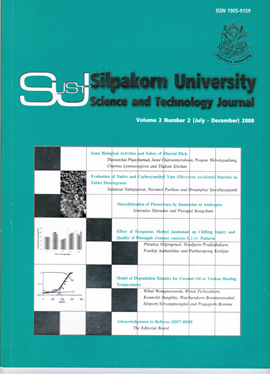Model of Degradation Kinetics for Coconut Oil at Various Heating Temperatures
Main Article Content
Abstract
This study was aimed to investigate the model of degradation kinetics for coconut oil at various heatingtemperatures. The oxidative stability of coconut oil at temperature variations between 130 and 200 °C wasinvestigated by UV absorbance measurement. The induction times (time-to-abrupt change) were determinedfrom the curves between the absorbance at 270 nm, related to amount of secondary oxidation products, andtime. The model of degradation kinetics was empirically estimated using non-linear regression. From theobtained model, coconut oil degraded via at least two different pathways while being heated, i.e., autocatalysisand first order reactions. This model could describe the entire degradation curve including the induction timebehavior of coconut oil at heating temperatures below 150 °C. However, at higher heating temperatures, theother pathways of degradation might occur which could not be explained by the proposed model.
Downloads
Article Details
References
Gomez-Alonso, S., Mancebo-Campos, V., Salvador, D., and Fregapane, G. (2004). Oxidation kinetics in olive oil triacylglycerols under accelerated shelf-life testing (25-75 °C). European Journal of Lipid Science and Technology, 106: 369-375.
Gonzaga, F. B. and Pasquini, C. (2006). A new method for determination of the oxidative stability of edible oils at frying temperatures using near infrared emission spectroscopy. Analytica Chimica Acta, 70: 129-135.
Guillén, M. D. and Cabo, N. (2002). Fourier transform infrared spectra data versus peroxide and anisidine values to determine oxidative stability of edible oils. Food Chemistry, 77: 503-510.
Halbaut, L., Barbé, C., Aróztegui, M., and Torre, C. (1997). Oxidative stability of semi-solid excipient mixtures with corn oil and its implication in the degradation of vitamin A. International Journal of Pharmaceutics, 147: 31-40.
Jayadas, N. H. and Nair, K. P. (2006). Coconut oil as base oil for industrial lubricants - evaluation and modification of thermal, oxidative and low temperature properties. Tribology International, 39: 873-878.
Kanner, J. and Rosenthal, I. (1992). An assessment of lipid oxidation in foods. Pure and Applied Chemistry, 64(12): 1959-1964.
Martin, A. (1993). Physical Pharmacy, Lea & Febiger, Philadelphia.
Muika, B., Lendl, B., Molina-Diaz, A., and Ayora-Cañada, M. J. (2005). Direct monitoring of lipid oxidation in edible oils by Fourier transform Raman spectroscopy. Chemistry and Physicsof Lipids, 134: 173-182.
Oliveira, J. T. G. and Regitano-d ́Arce, M. A. B. (2004). Determining economical TBHQ doses for corn oil stability. Ciência e Tecnologia de Alimentos, 24(3): 413-418.
Rudnik, E., Szczucinska, A., Gwardiak, H., Szulc, A., and Winiarska, A. (2001). Comparative studies of oxidative stability of linseed oil. Thermochimica Acta, 370: 135-140.
Velasco, J., Andersen, M. L., and Skibsted, L. H. (2004). Evaluation of oxidative stability of vegetable oils by monitoring the tendency to radical formation: a comparison of electron spin resonance spectroscopy with the Rancimat method and differential scanning calorimetry. Food Chemistry, 85: 623-632.
Vieira, T. M. F. S. and Regitano-d ́Arce, M. A. B. (1998). Stability of oils heated by microwave: UV - spectrophotometric evaluation. Ciência e Tecnologia de Alimentos, 18(4): 433-437.
Wylie, C. R. and Barrett, L. C. (1982). Advanced Engineering Mathematics, McGraw-Hill, Singapore.


